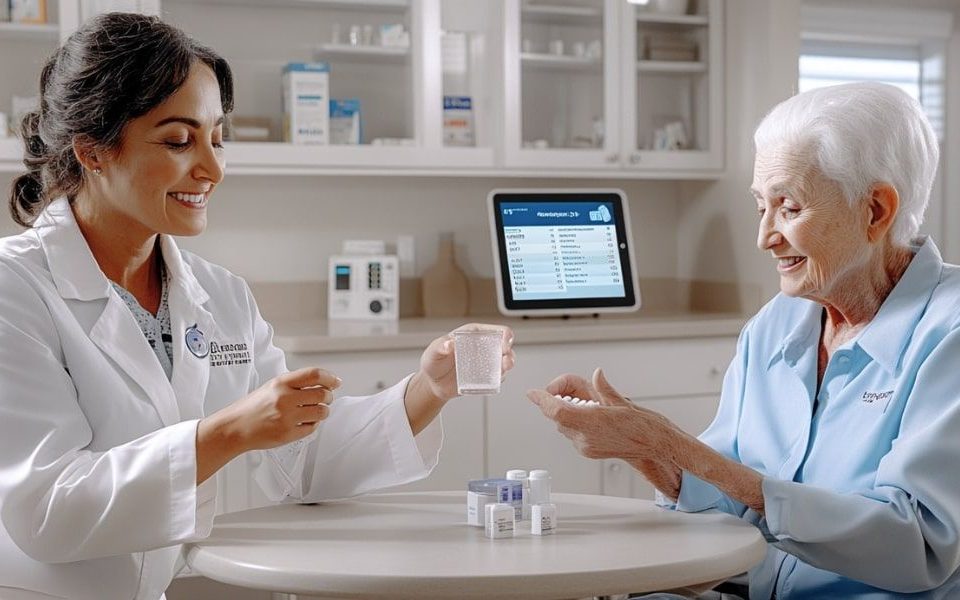
Top Benefits of Moving to an Independent Senior Living Community
February 27, 2025
Essential Security Features in Senior Living Communities
March 13, 2025Medication management is essential to quality care in senior living communities. Most older adults take prescription medications regularly, making proper handling critical for safety. Errors and overmedication in assisted living communities can lead to serious consequences. These range from minor side effects to severe health complications. In some cases, it can result in death. This post will explore how communities manage medications to prevent errors and ensure resident safety.
Preventing Medication Errors in Assisted Living Communities
While medication is necessary to manage various health conditions, it can also present a risk. The following are some issues that may be associated with medication mishaps:
- Health Risks: Incorrect dosages, missed doses, or wrong medications can cause adverse drug events (ADEs). Overmedication may lead to falls and injuries, cognitive decline, confusion, and unnecessary hospitalizations. Long-term health complications can also arise, compromising a resident’s well-being.
- Legal Consequences: Non-compliance with medication regulations can result in fines and legal action. Medication errors may also lead to lawsuits, damaging the community’s reputation and families’ trust. This loss of confidence can impact retention rates, referrals, and long-term sustainability.
- Financial Burden: Preventable medication errors contribute to higher healthcare expenses. Hospital readmissions, emergency interventions, and additional treatments for medication-related complications drive up costs. Increased insurance premiums and potential legal fees can place further strain on operational budgets.
Best Practices for Preventing Errors and Overmedication
Medication errors and overmedication pose significant risks to residents in assisted living communities. However, with careful planning, operators and caregivers can minimize these dangers. Here are key strategies to consider:
1. Establish Medication Policies
Establish clear protocols for medication administration, documentation, and storage. These include double-checking medication orders, verifying resident identities, and maintaining accurate medication logs. Regular audits can help identify and correct any discrepancies.
2. Prioritize Staff Training
Continuous education is vital for reducing medication errors. Train staff on medication side effects, proper dosages, and administration techniques. Additionally, encourage them to report mistakes without fear of repercussions, allowing for process improvements.
3. Leverage Technology
Adopt electronic medication administration records (eMAR) to reduce manual errors. These systems provide reminders, track medication schedules, and alert staff to potential interactions. Barcode scanning enhances staff accuracy in giving the right medication to the right resident.
4. Review Medications Regularly
Schedule periodic reviews with healthcare professionals to assess each resident’s medication regimen. These help identify unnecessary medications and potential drug interactions. Regular evaluations also ensure that medications remain necessary and dosages are appropriate.
5. Involve Residents and Families
Encourage residents and their families to participate in medication management discussions. Educating them about medications fosters a better understanding and promotes self-advocacy. Residents who are aware of their treatment plans are more likely to notice and report inconsistencies.
6. Promote Open Communication
Encourage collaboration between caregivers, nurses, and physicians. Regular team meetings and updates ensure everyone knows about changes to a resident’s medication plan. Clear communication reduces the risk of errors and ensures continuity of care.
7. Watch for Overmedication
Train staff to recognize signs of overmedication, such as confusion, drowsiness, or changes in behavior. Promptly addressing these symptoms can prevent serious health issues. Documenting observations and communicating them to healthcare providers is essential for timely interventions.
Preventing medication errors and overmedication in assisted living requires a collaborative, resident-focused approach. Implementing best practices enhances safety, improves medication management, and promotes well-being.
Prioritize Safe Medication Management with Dream Catcher
At Dream Catcher Senior Living, resident safety is our top priority. Our dedicated team follows best practices in medication management to promote health and well-being in a supportive environment. Contact us today to learn how we ensure safe, personalized care for every resident.



